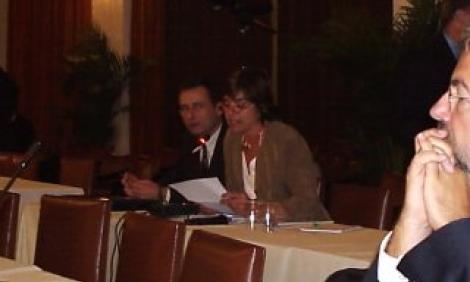In depth
Marcha Mundial de Mujeres - manos dadas alredor del mundo, pero no siempre frente a la pantalla
En el Foro Social Mundial 2005 la Amarc-WIN (International Women's Network of AMARC) organizó un taller sobre empoderamiento de las mujeres y los medios comunitarios. Entre los objectivos del encuentro, estaba lo de dar una atención particular a la Propuesta de carta internacional de las mujeres para la humanidad de la Marcha Mundial de las Mujeres y la evaluación de Beijing 10. El seminario…
In depth
Políticas públicas de inclusão digital e equidade de gênero – os hiatos e as pontes
Uma análise de diversos projetos e políticas de TICs e inclusão digital no Brasil mostra que a perspectiva de gênero não é considerada em nenhum deles. A autora reafirma a importância de que a perspectiva de gênero faça parte dos programas e políticas de TIC desde sua concepção inicial.
In depth
Mujeres son relegadas de los medios de comunicación
Un estudio elaborado por los estudiantes de la Maestría de Comunicación de la Universidad de San Carlos de Guatemala, advirtió menor presencia de las mujeres en los medios de comunicación de la existente en la sociedad guatemalteca.
In depth
Community radios and feminist voices against repression in Brazil
The repression against community radios in Brazil reaches important social projects and initiatives such as Novo Ar - a community association and radio station led by Graça Rocha. In this interview to GenderIT, Graça provides details about the repression that Brazilian community radios experience and highlights the critical role that women play in the radio and in the community: "women resist…
In depth
Culture, local traditions, and taboo - Challenges to the full expression of women’s voices
Popular communicators that work in community radio-telecentres in different states of Brazil talk about their achievements and apprehensions concerning the complete freedom to express themselves. As members of the Cyberela Network (Red Cyberela) developed by the feminist organisation Cemina, the communicators explain the reasons behind their self-censorship and how they gradually overcome taboos…
In depth
Gender issues at all levels – from policy formulation to implementation
Sonia Jorge is an expert in telecommunications regulation, economics and public policy and have been working as a consultant in the fields of communications policy and regulation, gender and development with experience in different countries and regions. Specialized in gender analysis and ICT policies, Sonia shares in this interview to GenderIT her vision on the critical needs for gender and ICT…
In depth
Women and ICT in Colombia: an issue still not completely incorporated in feminist agendas
Olga Paz, Administrative and Project Coordinator at Colnodo, a Colombian member of Association for Progressive Communications (APC), explains in this interview with GenderIT that in her country there is still not a clear gender perspective on national ICT policies and that there is still a way to go in achieving an understanding of the role of ICT as a political and strategic issue that can be…
In depth
Women developing FLOSS - freedom for knowlege free from prejudice
Sulamita Garcia is a 28-year-old consultant who specialises in Unix systems and is completely enthusiastic about free and open source software. She is responsible for the LinuxChix Brasil project. In this interview for GenderIT, Sulamita tells about the recent experience of LinuxChix Brasil, which is delivering online courses on FLOSS for women. She speaks about prejudice, stereotypes and the…
In depth
Gender and ICT policies: it's time to reorder our forces and understand what is happening
Magaly Pazello is the only Brazilian feminist who’s been active in the WSIS process since its inception. A member of the WSIS Gender Caucus, she is also member of the DAWN network - Development Alternatives with Women for a New Era. In the Latin America and the Caribbean Regional Preparatory Conference, held in June 2005 in Rio de Janeiro, Graciela Selaimen interviewed Magaly Pazello, speaking…
In depth
WSIS Rio regional meeting: very few doors open for the gender perspective
No participation of civil society as observers in the governmental delegations' meetings; no gender working group in the final regional action plan ELac 2007; almost no women, black people or indigenous people as panelists. Although the Rio WSIS Regional Meeting opened two slots for civil society statements in the plenary and produced documents which were fairly positively received by NGOs and…






